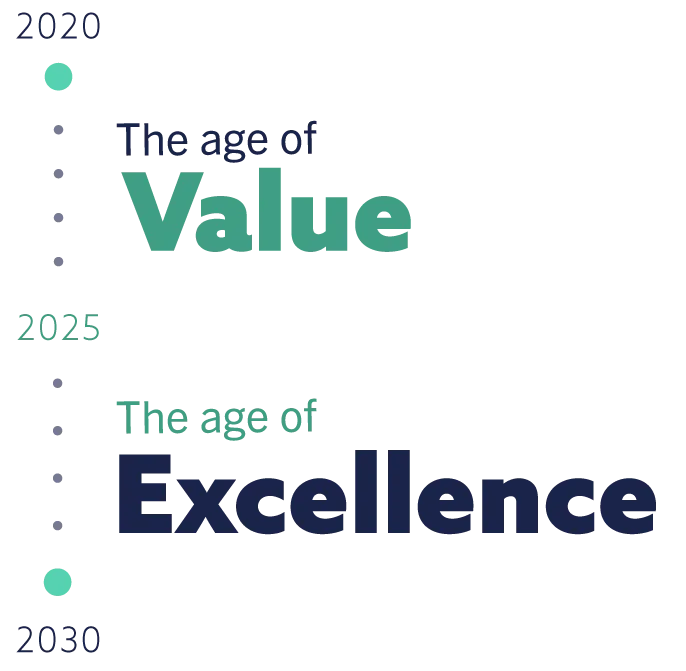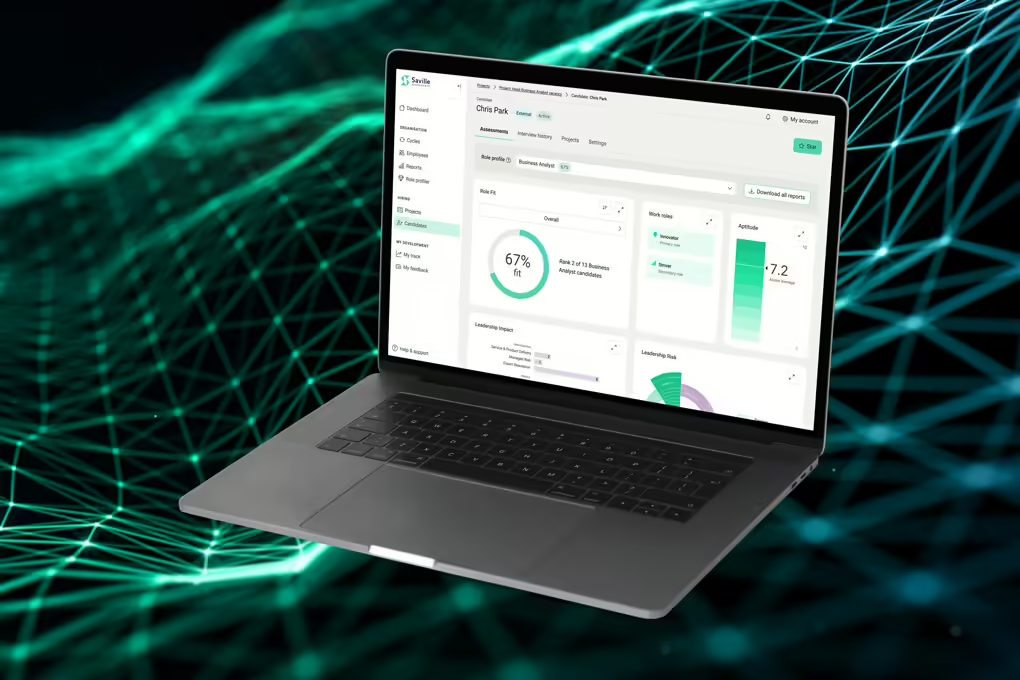Article · 5-minute read
By Olivia Black – 25th November 2024
Data is a powerful currency. In recent years, many organizations have shifted their mindsets, now recognizing data as one of their most valuable assets, along with their employees. It therefore isn’t surprising that the combination of those two assets has led to a growing demand for people analytics which, when used effectively, can provide organizations with a significant competitive advantage.
Historically, the rise of HRIS platforms has brought us closer to accessing the people data we need. However, many organizations still face challenges in accessing real-time data due to disparate departments, lack of data lakes and the reliance on accurate data entry.
According to a blog by Darwinbox1 on the future of people analytics, they describe 2020-2025 as ‘The Age of Value’, focusing on increasing ROI from people analytics. Moving ahead to 2025-2030s, they predict ‘The Age of Excellence’, where the potential of people analytics will be unlocked. This is the age in which HR and other communities will reap the benefits of data-literacy.

This new unlocking of potential from people analytics also highlights the importance of focusing on the right people data. As Forbes2 describes, “Every investment in data must solve a business problem.” This is certainly true for people analytics. People data should enable us to make smarter decisions. Many of these decisions can be critical and extremely costly if we get it wrong, with a poor leadership hire being an often used but highly relevant example. Speaking to HR experts, a challenge that has repeatedly come up in conversation is data overload. With so much more data becoming available, a common trap is providing too much information, making it hard to identify the key messages needed to aid effective decision-making.
At Saville Assessment, we remain focused on not only solving real business problems but also enhancing experiences.
To avoid the risk of data overload, one of our core design principles is data efficiency. We are focused on providing our users with the most relevant data points, empowering them to make smarter decisions quickly and confidently.

Our next-generation platform Wave Connect will provide carefully crafted dashboard outputs with data analytics that are most relevant to specific role levels. This relevance is shaped by a combination of listening to common questions about talent identification and our research on the optimal data points that drive objective decision making.
A common risk is overly focusing on one question, often stemming from a previous bad experience. For example, one leadership hire went wrong because they failed to effectively communicate their vision and strategy. Now fast forward to replacement hiring and the decision makers might become fixated solely on the candidates’ communication styles, ignoring other key data points.
Consequently, we have designed our data points to provide summarized decision-making outputs as well as detailed breakdowns that matter, encouraging you to ask the right questions:
Focusing on the right questions will lead to the right outcomes and help reduce the potential for bias created by stereotyping if you solely hone in on one aspect of an individual’s personality.
With our initial focus on talent identification applications, we are making our data more accessible to a wider audience. We are providing the outputs that truly matter, helping to make more accurate and objective decisions.
Our recent article on combined assessments highlights their predictive power and ability to reduce the risk of identifying a poor performer by 90%3. It also emphasizes the important role our data can play in increasing fairness. Not only can it help to maintain diverse talent pools, but our sophisticated data modelling can also enhance diversity through key steps in a hiring or talent identification journey.


Our focus on data efficiency extends to process efficiency, helping to speed up hiring decisions and ultimately reduce your time-to-hire.
With the power of this data comes a responsibility to manage it in the right way. Strong predictive data can build trust, but misuse can quickly break it. Having deep assessment expertise within your organization can help create operational strategies that ensure data is used appropriately throughout your process. Our customers have access to our team of assessment experts, who provide dedicated advice and support to guide their implementation journey. We work with you to map out your process and help define best practices for applying our data, ensuring a strong return on investment.
While we have mainly focused on considerations for hiring and talent identification, many organizations are now turning their attention to developing internal talent due to market instability. According to CIPD’s research, while recruitment remains important, the main people priorities for organizations globally are developing in-house talent, workforce planning and maximizing performance4. We see predictive assessment data playing a pivotal role in supporting these top priority areas by enhancing our understanding of individual skills potential. ‘Skills potential’ we define as a critical combination of underlying talent and motivation that enables an individual to acquire and develop a skill/skillset.
Breaking down the data silos reveals an increasing need to leverage data captured through the hiring process for employee development. Such insights are critical for transitioning into the next data era: The Age of Excellence in People Analytics. By gaining a deeper, more precise understanding of potential, we can optimize specific skills development journeys and provide meaningful recommendations.
Helping employees understand more about themselves fosters a culture of reflection, feedback and improved communication and working relationships across the organization.
To truly advance us to the new era of people analytics, assessment data must integrate into a systemic HR model, feeding into a unified data lake where the power of people potential can be realized throughout the employee experience.
Get in touch for more information on Wave Connect, our next-generation platform that will guide you through The Data Age, distilling complex data and streamlining your processes.
Olivia is an Associate Director at Saville Assessment and heads up our Client Solutions team.
You can connect with Olivia on LinkedIn here.


Managing Consultant Amber Williams looks at the benefits of combining multiple psychometric assessments into one single, seamless selection stage.
16th Oct, 2024

This paper explores practical strategies for talent management, offering insights into effectively embedding a science-backed approach to prepare for the skills revolution.
17th Sep, 2024

Hannah Mullaney is joined by author Mike Rugg-Gunn to discuss how the digital revolution has impacted talent management practices.
Apr 10, 2024
© 2024 Saville Assessment. All rights reserved.